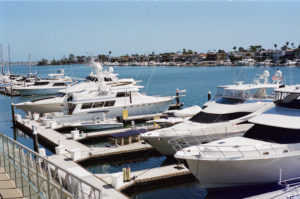One of the things that we are all taught in Law School, is that when considering a purchase/sale contract, one should think about when the risk that the goods are destroyed transfers from the seller to the buyer. Usually this also implicates the moment at which the insurance of the buyer and seller comes into play. Most boat transactions either have no contract (so the default rules apply) or they are governed by a contract prepared by the broker. Usually this leads to the same result — the seller must cover the boat until the sale is completed — then its on the buyer if the thing burns up or sinks. With the broker contract there is one other factor — the broker’s liability is usually waived and attorneys’ fees imposed for bringing him or her into a case.
I recently received a call from a purchaser with an incredibly hard-luck story. He paid cash for a (luckily!) relatively modest Luhrs so his family could enjoy the summer. The contract was prepared by the broker -and protected the broker especially. At the time of the transfer of the money (the boat was to be physically delivered 5 days later) the buyer executed the insurance application which was immediately faxed by the boat broker to an insurance broker referred by the boat broker. This took place on a Friday afternoon, with the boat to be picked up on the following Wednesday.
On Tuesday, things began to happen rapidly. First, the insurance broker called to say that the application was not correctly filled out, and that it needed to be resubmitted. Second, the marina called to say that the boat had sunk half way up the engines overnight (they’d called the seller first). Third, the buyer resubmitted the insurance application (rejected, sunk!); tried to stop the broker from paying out the funds (rejected – paid to lienholding bank); and the seller and the seller’s insurance refused to have anything to do with the boat. Uh oh. The buyer wisely had the boat secured and the engines pickled.
I wish I could say that I had a magic answer for this family. But I didn’t. The total purchase price was about $26,000. The repairs would probably cost $5-10,000. For me to become seriously involved would immediately eat into any money available for the repair, with no realistic promise that I could put the family in a better situation than if they simply put the money into the repair. Their issues were exceptionally complicated — including 1) whether they were the owners of the boat (probably not, as physical delivery had not occurred – see Purchase); 2) whether the seller and the seller’s insurance remained responsible (probably so, but forcing the issue would be costly); 3) whether the submitted application for insurance was sufficient to bind coverage, even if there were technical issues (probably enough to put the insurance broker on the hook – but again, expensive to enforce); and 4) whether the boat broker was liable for releasing the money, preparing a faulty insurance application, or on some other theory (probably yes, but with the risk of paying attorneys’ fees if unsuccessful).
These events served to highlight several issues for me. First and always — evaluate the question of risk of loss and look for avoidable issues should things go wrong. Second — many boat cases have papers transferred by mail in one manner; funds held in trust and delivered in a different way; and the physical boat transferring in yet a third location or time. In cases like this, planning for insurance to be bound and clarifying the parties’ obligations in the gray areas are crucial elements of a purchase and sale.
 Vessel Purchase and Advice
Vessel Purchase and Advice